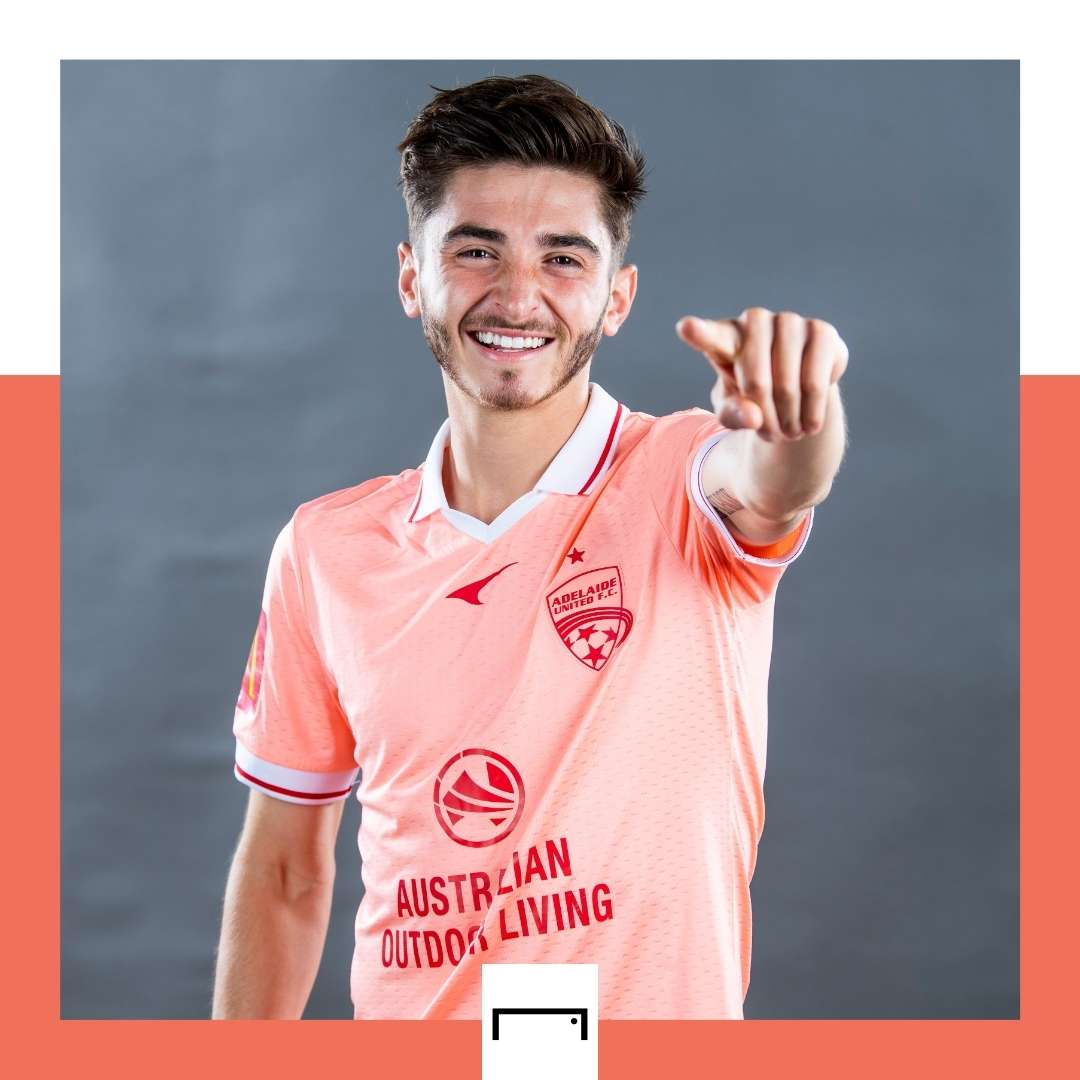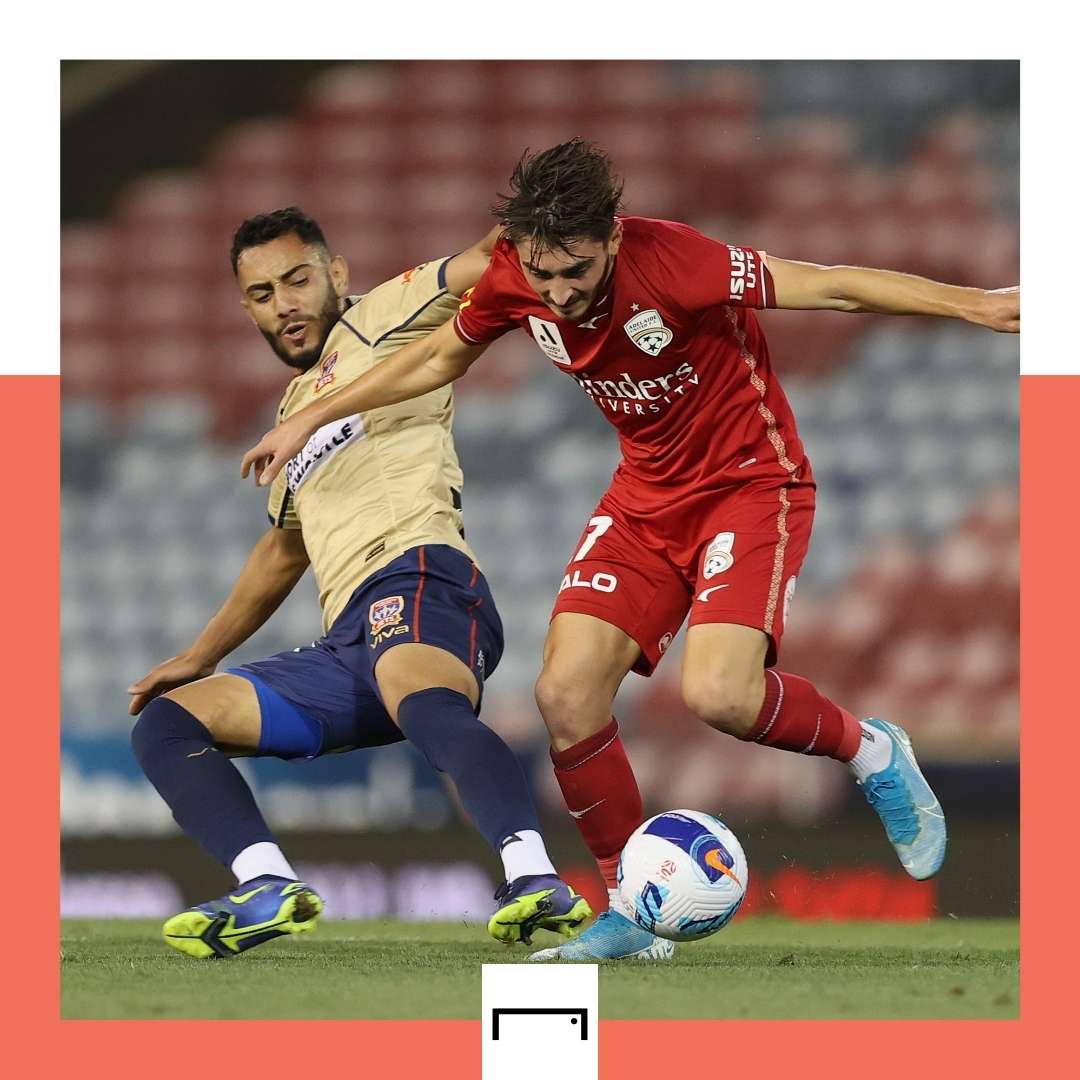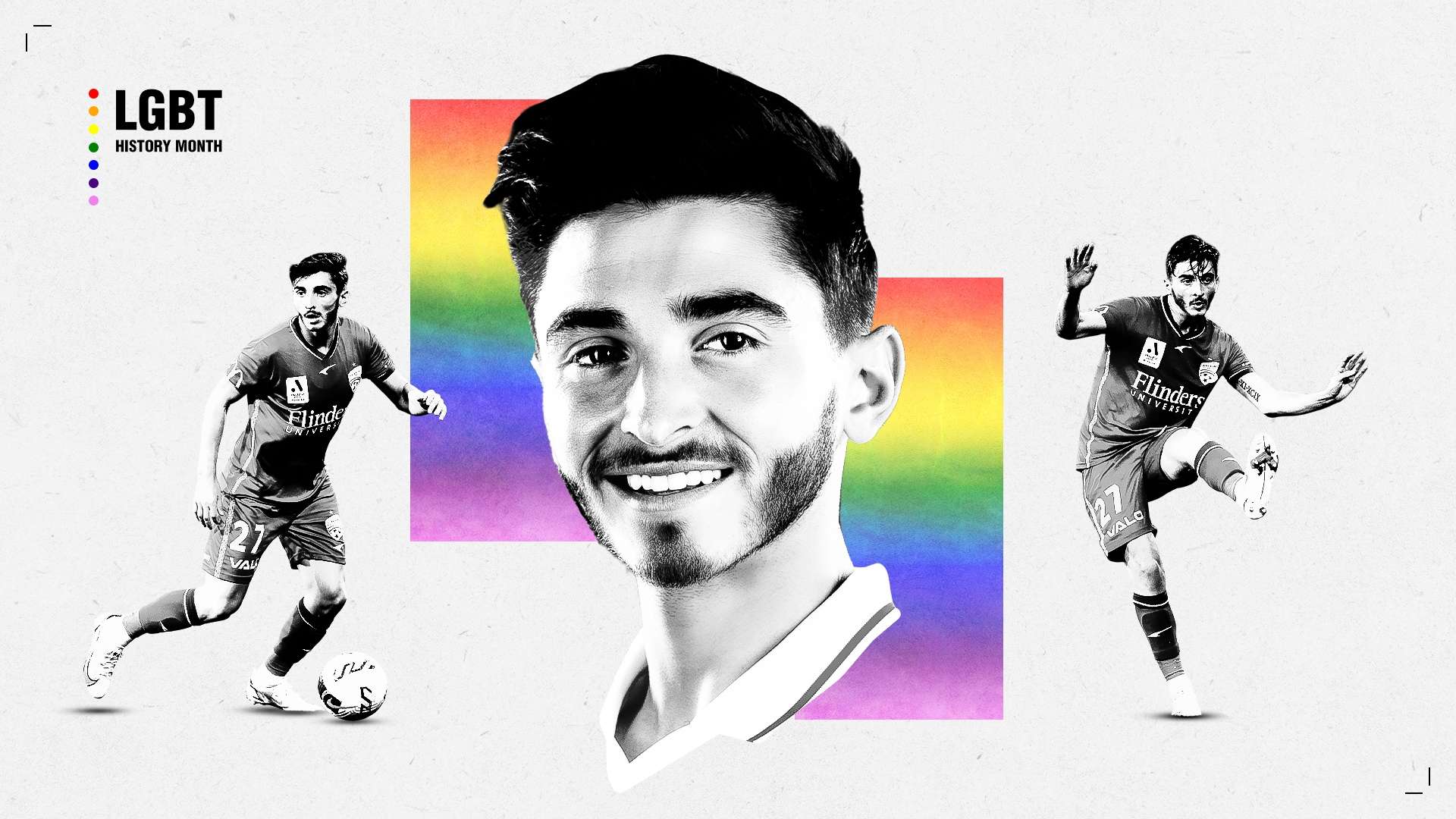Coming from a close-knit family of Italian and Maltese descent, Josh Cavallo has leaned heavily on them for support in the four months since a video posted on social media made him one of the world's most famous footballers.
The 22-year-old Adelaide United left-back, via a video posted to his and the club's accounts, came out as gay to the wider world on October 27 last year, thus becoming the only currently active male player in a top level league to do so.
Thrust into the intense spotlight of becoming a role model overnight for much more than what he does on the pitch, Cavallo's Melbourne-based family was initially unable to support him in person due to Australia's tough coronavirus restrictions.
Despite this, Cavallo – an enthusiastic, instantly likeable character who speaks with enthusiasm and excitement about his unique career and life story so far – says he could not have take such a momentous step without them.
Speaking exclusively to GOAL via video link from Australia, Cavallo said: "We spoke all the time on video calls, and on the phone, and they were incredible. Especially my brother Christian – he has been an absolute weapon in supporting me."
Cavallo is also delighted with the outpouring of love and affection he has had from all over the football world since coming out.
However, there has been a dark side, too, with vile homophobic abuse both in stadia and on social media.
When Adelaide United faced rivals Melbourne Victory in the A-League on January 8, Cavallo was targeted with slurs, chants and abuse during the game.
Victory were subsequently fined fined $5,000 AUD (£2,650), with Football Australia saying the money will be used to “further invest in LGBTQ+ awareness and education initiatives” in the sport.
The abuse continued online, with Cavallo subjected to death threats which are being investigated by police.
It led the young man to post an emotional message to social media, calling for an end to the abuse and for online platforms to do more to stamp it out.
But rather than looking for Victory or any group of fans to be dragged over the coals, he feels the only way is up for football as a whole.
He says: "At the time, I was disappointed, but now I see this as a learning moment for everyone to grow. As a professional athlete, no matter what sport you're in, it does affect you, it does get to you and it isn't a nice feeling.
"But I want to create awareness and show that it isn't ok to do that, no matter where you come from or what your beliefs are.
"We have children at these games, we have families, so we want to make it a respectable environment for everyone.
"In sport, if you make mistakes on the field as an individual, if you miss a goal or a tackle or a cross, you will get negative comments on social media. I treat it no differently to that.
"I'm lucky, I have support around me, but for the person who doesn't have that and receives this abuse, it could hurt them a lot more, and I wanted to create this awareness.
"Instagram, Facebook, Twitter or whatever need to be aware of this, because some people might not be strong enough and it could have severe consequences.
"Through all this came some positivity – Melbourne Victory got fined, and they donated to LGBT causes, which is an amazing step forward in Australian football.
"For me, it wasn't about punishment, it was about showing how this stuff still happens in 2022.
"When I came out, people asked, why does he have to announce it? These situations explain why it is still important.
"Growing up, I didn't have that gay role model, someone to look about to and say, 'He does what he loves and is able to be himself.' That's the representation I want to be for future generations.
"No matter where you come from, who you love or what you believe, as long as you're happy and do the thing you love, that's the most important thing.
"And you can still have a very successful career while being yourself – I think I'm a prime example of that."
The subject of whether social media companies should require ID for an account to be created has been debated long and hard, especially in the shadow of footballers getting increasing levels of racist, sexist and homophobic abuse online.
For Cavallo, there is no debate.
He says: "For a huge platform like Instagram or Facebook, there needs to be a system where an account has to have some form of identification.
"You have to link it to an address, or be traceable to your identity in some way, so you can't just have scam accounts with one or two followers leaving nasty comments.
"If platforms have verification processes, we will have less of this abuse. In the real world, people would not say those comments online if they were face to face."
The Australian football community as a whole, and especially Adelaide United, have supported Cavallo, with the most official show so far coming with the staging of the first official A-League Pride Games, the equivalent of Rainbow Laces in the UK.
For Cavallo, it is public confirmation of what he already knows about how much Adelaide have backed him, which he discovered when he informed his team-mates of the video he was about to feature in on October 27, 2021.
He says: "Twenty minutes before I pressed the post button, I was in the changing room with all my team-mates and coaches. I was very nervous, my heart was beating so quickly when I announced it.
"It was so emotional, something I'll remember for the rest of my life. Everyone gave me a big hug and said, 'We're so proud you can tell us who you really are.'
"What amazed me the most was that, 30 seconds after I made that announcement, me and the boys went straight back to talking about football and everything was normal again.
"That was exactly what I wanted, just to be accepted for who I was and not be treated any differently."
 Getty/GOAL
Getty/GOALWith being a gay player so often framed in football media as a source of angst and secrecy, with tabloid stories spreading Chinese whispers amid silhouetted pictures, and prominent ex-players and pundits bemoaning the lack of an out Premier League footballer and wondering who it could be, Cavallo looks back on the months since revealing his truth to the world – and he feels only happiness.
"It has been phenomenal, it honestly feels like a dream come true," he says. "From that time I clicked the post button on October 27, I can't explain to you how happy it has made me.
"The support I have got from my family, my team-mates, my peers, my friends, and worldwide was just phenomenal, and made me wonder why I had been hiding this for so long.
"It was a big relief, it had been a long time coming and I couldn't be prouder. To this day, I have no regrets about posting it, and announcing who I am to the world."
Other footballers who have come out while playing, such as former MLS player Collin Martin, have said that the pressures of playing while having the focus that comes with being that rarest of things in men's football – openly LGBT+ – have affected their performances negatively.
It's not been a problem, though, for Cavallo, who feels he is now playing under less pressure than ever.
Given he is no longer wrestling internally with his sexuality, he can put more energy into his football.
 Getty/GOAL
Getty/GOAL"Definitely," he says, when asked if the additional scrutiny has impacted him as a footballer. "Before I came out I told my two coaches, and that was a massive weight off my shoulders.
"Now the whole world knows? I can't explain how good I feel and how free I am on the pitch.
"So, now it's just important that I can focus on being Josh Cavallo the footballer. That's how I want to be known, not as Josh Cavallo the gay footballer. Being gay is just one part of my life, it was my talent that got me where I am.
"It can be overwhelming at times, but I took it in my stride. It's crazy really, sometimes when I play I get both sets of fans cheering for me, fans from the opposition wanting photos after the game.
"There's something really special and gives me confidence to grow even more. There's a buzz inside me which makes me want to keep impressing and grow for the better. This is a fantastic opportunity."
Cavallo is embracing his new found status as a role model for young players, whether LGBT or not, which was something he lacked growing up.
He agrees with his close friend Thomas Beattie, who told GOAL that a lack of education and support for academy players who might be struggling with their sexuality has led to many dropping out of the game, or in Beattie's case, struggling with their mental health throughout their career in the game.
Cavallo wants to be as much of a visible role model as possible – and is delighted to see some changes already happen as a result.
"Growing up I didn't have someone I could look up to, or find any acceptance anywhere to say it was ok to be gay and play football," he says.
"What really touched my heart was when I came out, my old junior team, Brighton Soccer Club in Melbourne, reached out and said that in honour of me, on the sleeves of their jersey they are going to have a Proud 2 Play logo [Proud 2 Play is a group which promotes LGBT+ inclusivity in Australian sport].
"This is phenomenal – any team Brighton play, kids will see that and know it is a safe place to be themselves. More clubs need to do that.
"We don't know if the next big talent has been turned away from the game because they don't fit in. I wish that in my youth football days, I had something like that."
This feeling of exclusion, of not always feeling wanted in the sport he loves, has led Cavallo to be a vocal supporter of transgender people, including a short but brutal response to the trans-exclusionary LGB Alliance when they attempted to congratulate him on his public announcement.
The one time Cavallo's perma-smile drops during our conversation is when discussing trans people participating in sport.
He is firm in his support, and welcomes trans people competing in sports corresponding to their gender right to the very top level.
"I know what it is like to be on the outside, to not fit in. I know I now have a powerful platform on social media... so it was very important for me to say something like that [his pro-trans tweet]," he says.
"I'm not just for the gay community, I'm for the trans community, I'm against racism, I'm for everyone, because that [exclusion] is not on.
"It's 2022 and we're still struggling with gay people being accepted in football. It's no different for transgender people for me: if someone is really talented in a sport, it doesn't matter where they come from, we have to be very accepting and inclusive.
"Things like that badge on the sleeve, that helps people who might find themselves isolated from the world and feel like they don't fit in.
"In 10 or 15 years, we won't even need to have this conversation, there could be trans people playing in top leagues around the world – that shouldn't be a problem.
"We are all humans on this planet and deserve to be treated equally."
The most discussed topic regarding LGBT people and football has been the Qatar World Cup later this year. Homosexuality is illegal in the state, with punishment of up to three years in prison.
Cavallo has, since coming out, talked to organisers and publicly spoken of the reassurances he has been given regarding the safety of LGBT people travelling to watch, report on or play in the tournament.
"It did concern me, seeing that the World Cup is in a country which does not approve of the LGBT community," he says.
"It made me wonder, is my life more important than doing something really good in my football career.
"But the Qatar World Cup community, they have made me very welcome, this is going to be a safe space, you will not be treated any differently.
"I want to keep my message powerful, that I do stand for my LGBT community, and I want the best for everyone. And if I get the chance to represent the Socceroos, I will be there, there is no doubt."
Ending 2022 at a World Cup would conclude an incredible year-long journey for Cavallo, but there is a long way to go before then.
He will, as he has done throughout his career and especially since last October, take it in his stride.
"I'm only 22, I'm gonna make mistakes along the way. I'm learning as I go."
